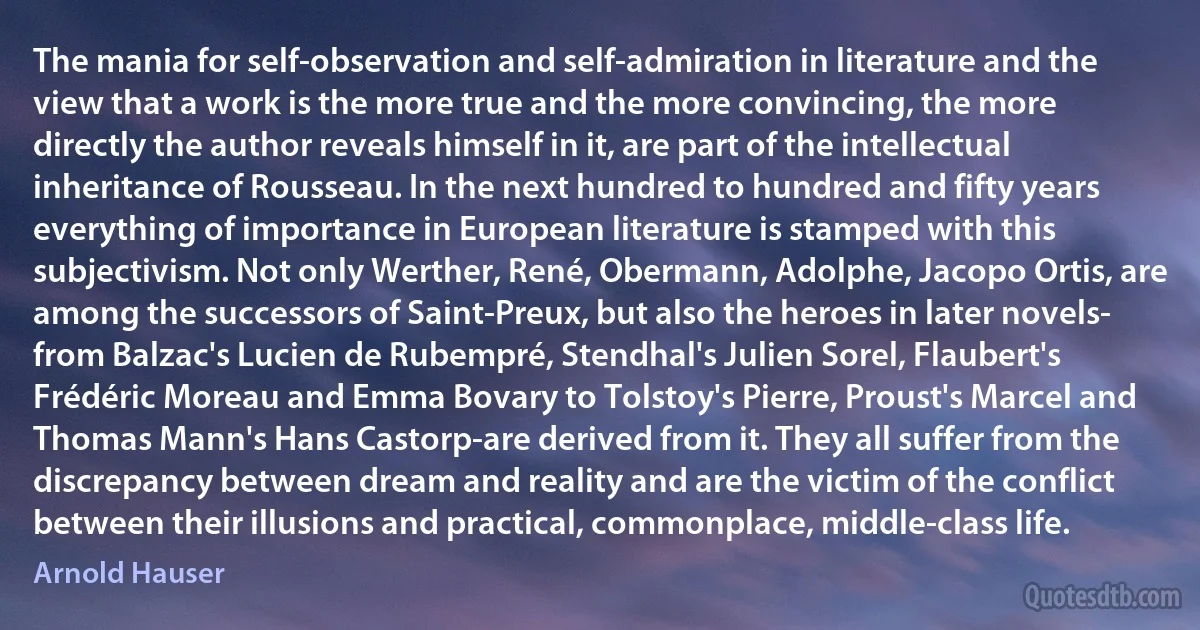
The mania for self-observation and self-admiration in literature and the view that a work is the more true and the more convincing, the more directly the author reveals himself in it, are part of the intellectual inheritance of Rousseau. In the next hundred to hundred and fifty years everything of importance in European literature is stamped with this subjectivism. Not only Werther, René, Obermann, Adolphe, Jacopo Ortis, are among the successors of Saint-Preux, but also the heroes in later novels- from Balzac's Lucien de Rubempré, Stendhal's Julien Sorel, Flaubert's Frédéric Moreau and Emma Bovary to Tolstoy's Pierre, Proust's Marcel and Thomas Mann's Hans Castorp-are derived from it. They all suffer from the discrepancy between dream and reality and are the victim of the conflict between their illusions and practical, commonplace, middle-class life.
Arnold HauserRelated topics
commonplace discrepancy dream everything fifty hero hundred inheritance intellectual later life next subjectivism view work years rousseau marcel pierre emma hansRelated quotes
Our civilization depends on peace among Western nations, and therefore on united strength, for Peace is a virgin who dare not show her face without Strength, her father, for protection. We can have peace and security only so long as we band together to preserve that most priceless possession, our inheritance of European blood, only so long as we guard ourselves against attack by foreign armies and dilution by foreign races.
We need peace to let our best men live to work out those more subtle, but equally dangerous, problems brought by this new environment in which we dwell, to give us time to turn this materialistic trend, to stop prostrating ourselves before this modern idol of mechanical efficiency, to find means of combining freedom, spirit, and beauty with industrial life - a peace which will bring character, strength, and security back to Western peoples.

Charles Lindbergh
During my travels, I find a general belief that to turn a Christian is to turn European; to become self-willed, and give up self-restraint, use only foreign cloth, dress oneself in European style and start taking meat and brandy. But I think the fact is, if a person discards his country, his customs and his old connections and manners when he changes his religion, he becomes all the more unfit to gain a knowledge of God. For, a change of religion means really a conversion of the heart. When there is a real conversion, a man's heart grows. But in this country one finds that conversion brings about deep disdain for one's old religion and its followers, i.e., one's old friends and relatives. The next change that takes place is that of dress and manners and behaviour. All that does great harm to the country.

Mahatma Gandhi
That noble Lord is of opinion, not only that we ought to exclude Natives from office, but that even by encouraging them to study the arts and learning of Europe, we are preparing the way for the utter destruction of our power in India. I must leave it to the noble Lord to explain what seems to me a rather singular inconsistency in his opinion. I am at a loss to understand how, while utterly contemning education when it is given to Europeans, he should regard it with dread when it is given to Natives. This training, we are told, when given to a European, makes him a bookworm, a twaddler, a man unfit for the active duties of life; but give the same education to the Hindoo, and it arms him with such an accession of intellectual power, that an established government, with an army of 250,000 men, backed by the whole army and navy of England, are to go down inevitably before its irresistible power.

Thomas Babington Macaulay
The paper develops a new theory for the analysis of games with incomplete information where the players are uncertain about some important parameters of the game situation, such as the payoff functions, the strategies available to various players, the information other players have about the game, etc. However, each player has a subjective probability distribution over the alternative possibilities.
In most of the paper it is assumed that these probability distributions entertained by the different players are mutually "consistent," in the sense that they can be regarded as conditional probability distributions derived from a certain "basic probability distribution" over the parameters unknown to the various players. But later the theory is extended also to cases where the different players' subjective probability distributions fail to satisfy this consistency assumption.

John Harsanyi
For what advantage is it, that the world enjoys profound peace, if thou art at war with thyself? This then is the peace we should keep. If we have it, nothing from without will be able to harm us. And to this end the public peace contributes no little: whence it is said, ‘That we may lead a quiet and peaceable life.' But if any one is disturbed when there is quiet, he is a miserable creature. Seest thou that He speaks of this peace which I call the third (inner, ed.) kind? Therefore when he has said, ‘that we may lead a quiet and peaceable life,' he does not stop there, but adds ‘in all godliness and honesty.' But we cannot live in godliness and honesty, unless that peace be established. For when curious reasonings disturb our faith, what peace is there? or when spirits of uncleanness, what peace is there?

John Chrysostom
